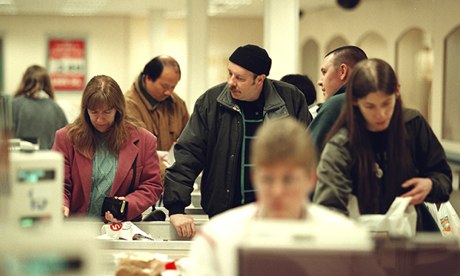Community Shop in Goldthorpe gives local shoppers access to surplus food from supermarkets for up to 70% less

Community Shop customers will not only get access to cheaper food, but will also be offered social and financial support. Photograph: Murdo Macleod
Britain's first "social supermarket" opens its doors on Monday, offering shoppers on the verge of food poverty the chance to buy food and drink for up to 70% less than normal high-street prices.
If successful, the Community Shop, in Goldthorpe, near Barnsley, south Yorkshire, which is backed by large retailers and supermarkets, could be replicated elsewhere in Britain.
Community Shop is a subsidiary of Company Shop, Britain's largest commercial re-distributor of surplus food and goods, which works with retailers and manufacturers to tackle their surpluses sustainably and securely.
It sells on residual products, such as those with damaged packaging or incorrect labelling, to membership-only staff shops in factories. The new project goes one step further, located in the community for the first time and also matching surplus food with social need.
Membership of the pilot store – in Goldthorpe, an area of social deprivation – will be restricted to people living in a specific local postcode area who also get welfare support.
Individuals who shop at Community Shop will not only get access to cheaper food, but will also be offered programmes of wider social and financial support, such as debt advice, cookery skills and home budgeting.
The scheme is being supported by retailers, brands and manufacturers, including Asda, Morrisons, Co-operative Food, M&S, Tesco, Mondelez, Ocado, Tetley, Young's and Müller. All are diverting surpluses to the pilot.
Company Shop hopes to open Community Shops in London and beyond next year should the pilot prove successful and sustainable.
-------

No comments:
Post a Comment